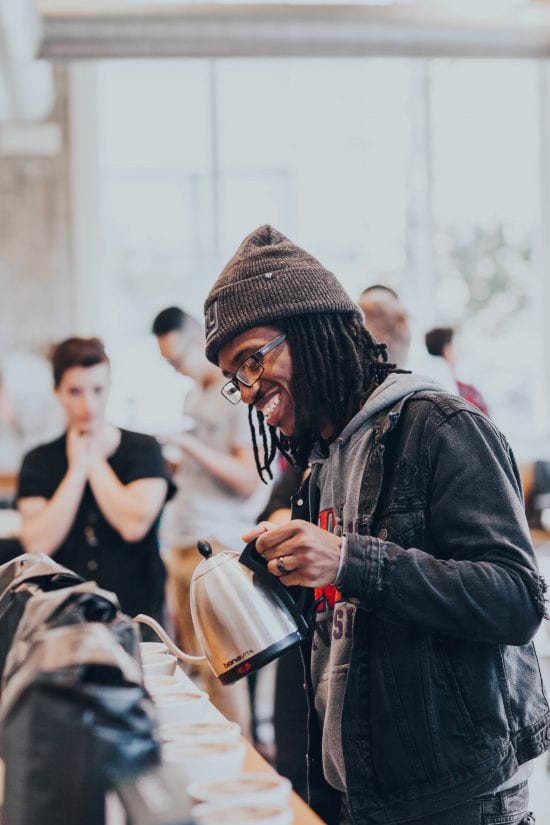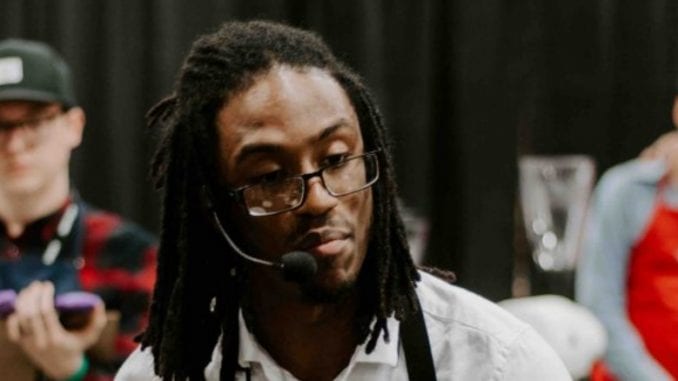
Anthony Ragler, barista competitor and Glitter Cat trainee, talks about his first job in Brooklyn, N.Y., how his upbringing influences his perspective, and his dedication to his craft.
BY ASHLEY RODRIGUEZ
BARISTA MAGAZINE ONLINE
Cover photo by Paige Hicks
I have to admit—I love sharing interviews with folks when I have an adjacent story to tell about them.
When the Glitter Cat Barista Bootcamp selection committee came together to choose the 10 baristas that would participate in the inaugural class, Anthony Ragler’s application was a standout for two reasons—one, because his accomplishments and answers were amazing, but two, as we scrolled down his application, fellow committee member Adam JacksonBey (who is on the cover of the February + March 2019 issue of Barista Magazine) stopped for a moment and said, “Wait … he didn’t even mention that he placed THIRD at the D.C. qualifier!” We knew instantly he’d not only be an amazing member of this first class of Glitter Cats, but that he was going to do well.
And he did. He placed 10th at the Nashville, Tenn., qualifying event this past January, and you’ll see Anthony compete again in Kansas City, Mo., at the United States Barista Championship. Before he competes, we got to know a little about his coffee career and what he hopes to achieve in the future.
Ashley Rodriguez: When did you first start making coffee? What was your first coffee job like?
Anthony Ragler: I started working in the coffee industry in May of 2014. A friend of mine was a manager of a café at the time I needed a job, and offered me an opportunity to work for him. I had no knowledge of specialty coffee at the time, and barely any knowledge of coffee itself, but I took the job seriously, and put forth a lot of effort to learn as much as I could. It was a very small, tight space in the middle of Park Slope in Brooklyn, and at the time, they had a second location near Washington Square Park.
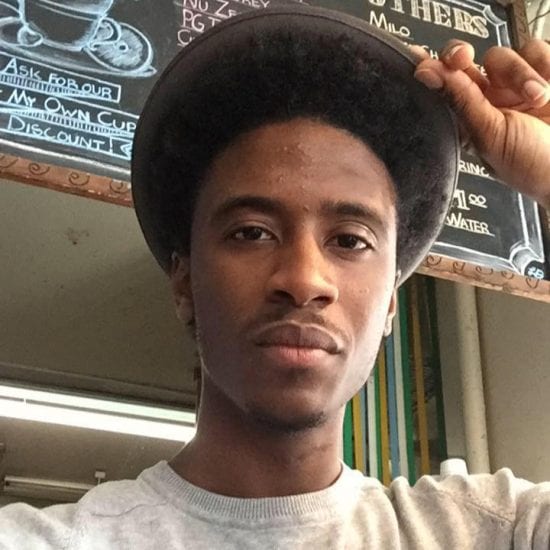
I had a lot of growing pains, since this was a place where most of your learning was on the fly. I actually remember on my first shift alone, since this was a New Zealand-inspired shop, a customer came in and ordered a flat white. I had absolutely no clue what it was, and he actually coached me from across the counter on how to properly make it. That story is much funnier now, but day of, I couldn’t imagine being more embarrassed.
When was your first “aha”moment? When did the idea of a coffee career become something you were interested in?
Honestly, the coffee aspect of it was the last portion of what hooked me. Working at the café I previously mentioned, I was the second Black person ever hired there, and it was very weird being in a part of Brooklyn that felt so unfamiliar. None of the customer base looked like me or seemed to have any knowledge of the background I came from, but two things started to change that.
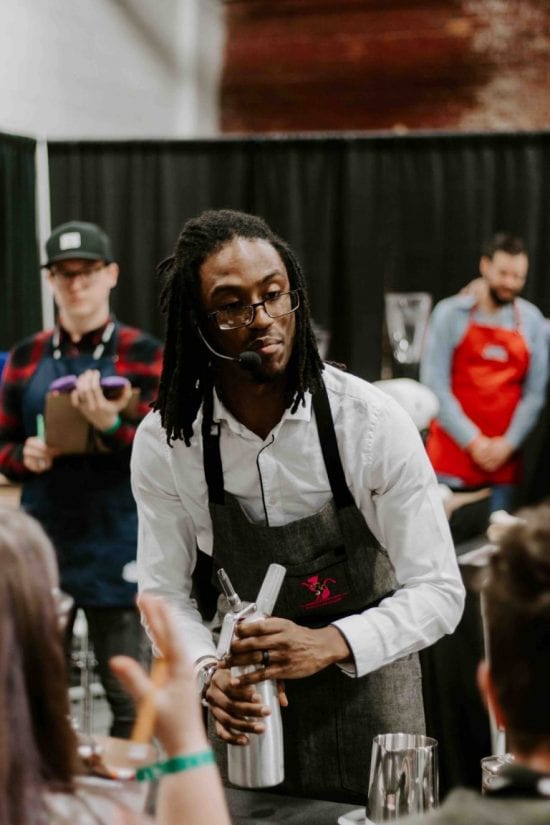
Photo by Paige Hicks 
Photo by Kayla Phaneuf
The first was that my friend decided to go to law school a few months after I started, and then I was selected to be the new general manager of the shop. That led to regulars seeing me much more often, and mutually us getting to know and understand each other much more. I also watched as more POC felt welcome to come into the space, and truly got to see how the café culture can become such an important staple in people’s lives and foster a space for communal growth. This made me attach my personal goals of being able to create mediums for success for people from my demographic, to being able to do so in the industry of specialty coffee.
I started to find that doors would open if I continued to work at honing this craft, and that I could also present this to people where I’m from as a space they could benefit from and feel just as welcome and at home in.
What inspired you to compete?
I come from a very competitive background. I played sports as a child, all the way up until I broke my neck in a car accident, and then after that competed in many other different artistic forms that I had a passion for. It was only a matter of time until the barista competition bug hit me. I feel like competition is a way for you to get to see people elevate beyond what they know their capabilities are, so it’s a space I always love being in, watching people strive toward perfection at something they love.
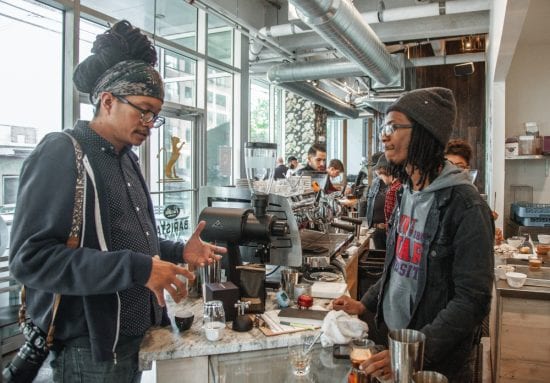
What did you learn from being a Glitter Cat participant? How did it make you a better competitor?
Glitter Cat taught me how to focus on what matters. Being someone with so many big ideas, and goals for what I want to do within competition, and the industry at large, I felt I had so much to talk about, and not enough time to do so.
Glitter Cat helped me focus a lot of those thoughts, and say the most important things, that will allow for the message I intend to send to resonate with people. It’s my first year competing, so as much as I want to win, I know my inexperience gives me an ability to stay true to myself and not follow trends of what “works” in competition. Glitter Cat helped me find that balance of being precise in all my technical aspects, and being an individual that wants to influence change.
Can you tell us more about your routine? What did you learn from competing and what will you take with you as you train for USBC?
Being raised in Brooklyn, the experiences that stick with me are the ones that affected the culture of everything around me. When I think of how café culture can become such a norm in people’s everyday lives, it immediately makes me think about the relationships we have in my old area with the corner store that we frequent. I wanted to take the most special parts of that experience, and inject that into a café experience.
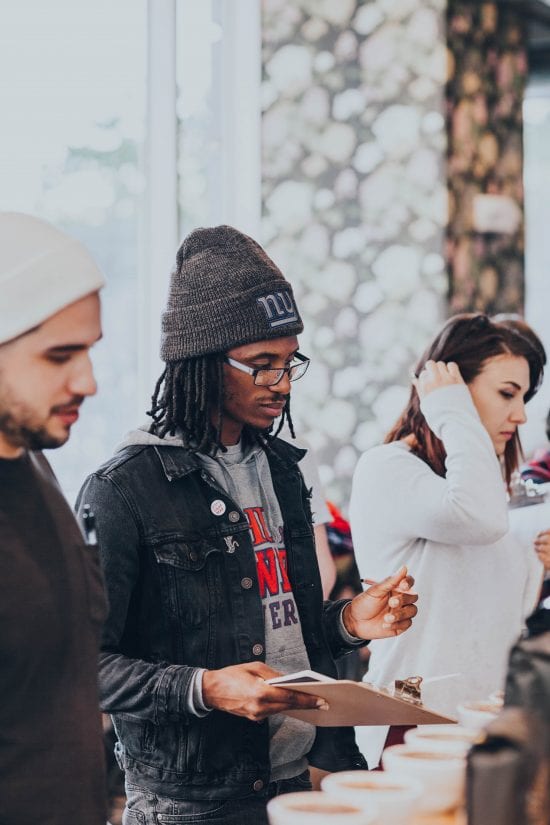
That became the overarching theme for my routine, as I wanted to honor how humble and loving the people at corner stores have been in my life, and how their emphasis on making a daily transaction feel like home is something that, being a barista, I was able to take with me and use in my dealings with customers. As far as what I learned that I’ll take to USBC, I definitely have a lot of places in which I see room for improvement, and mistakes that could’ve easily been avoided. I think the biggest thing I plan to do is make sure no matter how USBC goes, I leave a lasting positive impact beyond my 15 minutes of stage time.
How do you think your story is different from others? How would you want people to remember you?
The moments and spaces that impact my view of specialty coffee comes from the people I connected with along the way. I was blessed to work in Brooklyn and PG County, Maryland, so many of the baristas I met looked like me, came from experiences similar to mine, and understood me in ways that spanned past being coworkers.
For many of them, being a barista isn’t a life passion, or is just the thing they’ve done to sustain themselves. As I have been blessed to enter other facets of the industry, the amount of people that look like me and come from my background has decreased exponentially. I think that being able to pay homage to those I’ve become close with along the way, and represent myself in a way that honors that experience, is vital, and it’s important to me to be true, authentic, and aim for excellence at every step of the way.
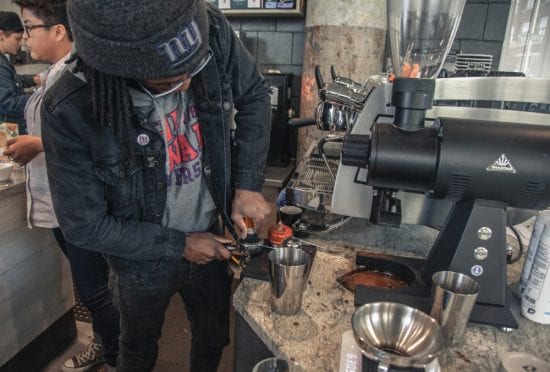
I want people to remember me as someone who’s dedicated to his craft, but does so with a love and compassion for people that doesn’t waver. I think those two things aren’t mutually exclusive, and that I can lean on the experiences of where I come from to help navigate the places I’ve yet to reach.
What does the future look like for you?
Well, hopefully World Barista Champion one day. But in all seriousness, I think the best thing I can do is continue to learn and grow. I have a long way to go before I am comfortable creating my own company, or café (things that I’ve definitely decided I want to do), and in the time leading up to me getting comfortable, I want to be a sponge for knowledge, and build some everlasting bonds along the way.
Whether it’s in my own company or someone else’s, I want the work that I do to be able to create mediums for more voices to be heard and accepted. Alongside that, I want success to look different for every person that comes along and truly wants it. I just want to make sure that there are people who can identify in a cause or a goal that speaks to them, and that the proper resources are accessible to them to reach it.

